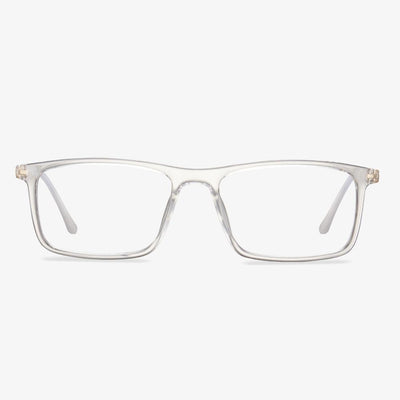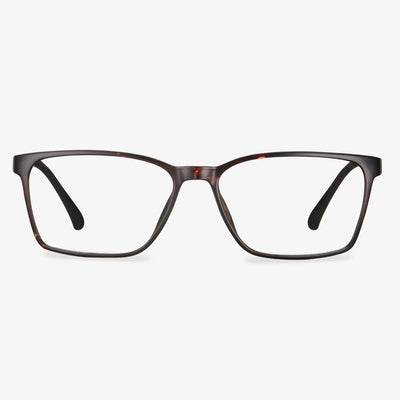Find the right size
The right glasses should sit comfortably on the bridge of the nose, not pressed against the forehead or cheeks. But they don't stay at the tip of the nose for so long that they slip while squinting or wrinkling your nose. The fit of the nose determines the distance between the glasses and the face. A proper fit should allow the lens to be between 14 and 24 millimeters away from the eyes. When you want to find glasses that fit, don't clip, don't slip, and don't lead to discomfort, you have to find out the size you need.
How to test a blue-light lens?
When the glasses are placed in front of a display screen or watched in the environment with LED light, the blue-light-blocking lenses reflect blue lights, while the non-anti-blue lenses do not reflect blue lights. Of course, there are a small number of blue-blocking glasses that reflect green lights.
The price of prescription glasses
You need a current (unexpired) prescription to order glasses online. You will enter your prescription and select the available lens options during checkout. Prescription glasses start at about $40. Single vision lenses are free when you buy the frames, and progressive wireless lenses typically cost an extra $80 or so. Other lens options include clear lenses with no extra charge, basic tone lenses (for sun protection) with the price of $40,polarized-tone lenses (for protection and glare reduction)with the price of $50, and transition lenses (for indoor and outdoor use) with the price from $65.
Basic principles of progressive lenses
The surface of the progressive slice is divided into five regions. There are far, middle, and near optical areas. They are respectively corresponding to see distant objects, middle distance objects in the near distance objects. One pair of glasses is multi-purpose. In appearance, it is not very different from regular lenses. There is no clear dividing line. Distal use area: The area above the progressive slice is the distal use area, which is used to correct the distal refractive error. Proximity area: from the matching lens cross down, the refractive power of the lens continuously increases the positive degree, which is used to see close objects. Gradient area: The channel connecting the far and near areas. It is an area of regular change from top to bottom, used for transitioning and seeing objects at intermediate distances. The length of the gradient is very important for the wearer's adaptation. The rate at which the degree of gradient changes is called gradient. The gradient can be uniform or variable. Peripheral area: Changes in the surface curvature of the lens will lead to aberrations in the peripheral areas on both sides of the lens, mainly astigmatism and prism effect, which will interfere with a vision to a certain extent, resulting in blurred vision or distortion. And it will affect the wearer's adaptation to the progressive lens.
Can You Wear Glasses Without Prescription?
So, can you wear glasses without prescription? Of course, you can. You can wear glasses without prescription and they would not cause any damage to your eyes. What’s more, some non-prescription glasses, such as the type that blocks harmful blue light, can be beneficial to your eyes.
What Are High Index Lenses?
High index lenses are eyeglasses lenses that are designed to be thinner and lighter than regular lenses. High-index lenses have a high refractive index than their conventional counterparts. High index lenses are recommended for people who have significantly high refractive errors and strong prescriptions for nearsightedness, farsightedness or astigmatism.
High index lenses are thinner, lighter and more appealing than standard lenses, but they come in several different indexes such as 1.67 high index lenses and 1.74 high index lenses. In this post, we will focus on the 1.67 high index lenses and 1.74 high index lenses.











































